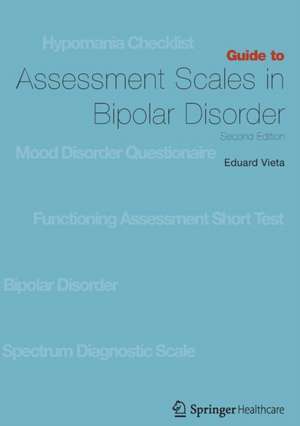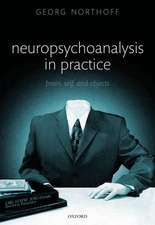Guide to Assessment Scales in Bipolar Disorder: Second Edition
Autor Eduard Vietaen Limba Engleză Paperback – 17 iul 2012
Written for psychiatrists, clinical researchers, mental health nurses and other healthcare professionals who use rating scales in clinical practice
Provides rating scales that can be used for the systematic evaluation of patients in standard clinical practice
The evidence base in each chapter has been expanded and brought fully up-to-date
Schizophrenia is a chronic disease encompassing a range of symptoms including hallucinations, delusions and social withdrawal. Different measurement tools are utilized to assess the symptoms of schizophrenia. The previous two editions of the Guide to Assessment Scales in Schizophrenia are now outdated and no longer clinically correct so this completely new edition written by a new team of leading clinicians and researchers brings you fully up to date with recent developments.
Preț: 357.41 lei
Preț vechi: 376.22 lei
-5% Nou
Puncte Express: 536
Preț estimativ în valută:
68.39€ • 71.41$ • 56.47£
68.39€ • 71.41$ • 56.47£
Carte tipărită la comandă
Livrare economică 15-29 aprilie
Preluare comenzi: 021 569.72.76
Specificații
ISBN-13: 9781858734422
ISBN-10: 1858734428
Pagini: 92
Ilustrații: VII, 92 p.
Dimensiuni: 148 x 210 x 10 mm
Greutate: 0.14 kg
Ediția:2nd ed. 2009
Editura: Springer
Colecția Springer Healthcare
Locul publicării:Tarporley, United Kingdom
ISBN-10: 1858734428
Pagini: 92
Ilustrații: VII, 92 p.
Dimensiuni: 148 x 210 x 10 mm
Greutate: 0.14 kg
Ediția:2nd ed. 2009
Editura: Springer
Colecția Springer Healthcare
Locul publicării:Tarporley, United Kingdom
Public țintă
Professional/practitionerDescriere
Building on the success of the first edition, this second edition has been extensively revised and updated to include recent developments in the assessment of bipolar disorder. Each chapter summarizes the key issues surrounding a particular area of bipolar disorder or bipolar spectrum disorder and presents the most commonly used scales in their evaluation. The evidence base in each chapter has been expanded and brought fully up-to-date. In addition, two new chapters have been added on assessment of functioning and assessment of suicide risk in patients with bipolar disorder. The assessment of functioning chapter introduces the newly developed and validated scale, the Functional Assessment Short Test, which assesses six major areas of functioning and is now widely used as an outcome measure in epidemiologic and observational studies. The assessment of suicidality chapter features the Columbia Classification Algorithm of Suicide Assessment which classifies suicidality based on empirical findings and predictive risk factors.
Written by a world renowned leading expert in the field of bipolar disorder, this second edition of a Guide to Assessment Scales in Bipolar Disorder is an essential reference for all clinicians and health professionals providing a concise selection of the key assessment tools for evaluating the patient with suspected bipolar disorder.
Written by a world renowned leading expert in the field of bipolar disorder, this second edition of a Guide to Assessment Scales in Bipolar Disorder is an essential reference for all clinicians and health professionals providing a concise selection of the key assessment tools for evaluating the patient with suspected bipolar disorder.
Cuprins
Global assessment scales.- Detection of bipolar I.- Detection of bipolar II.- Assessment of depression in bipolar disorder.- Assessment of mania in bipolar disorder.- Assessment of hypomania.- Health-related quality of life assessment in bipolar disorder.- Assessment of pediatric bipolar disorder.- Assessment of comorbidities.- Assessment of functioning.- Assessment of suicidality.
Notă biografică
Eduard Vieta is Professor of Psychiatry and the Director of the Bipolar Disorders Program of the Hospital Clinic at the University of Barcelona, Spain. His program is dedicated to providing excellent healthcare for people with bipolar disorder, ducation and research, and has received worldwide recognition. Professor Vieta also serves as Director of Research at the Clinical Institute of Neuroscience at the same institution and has been an invited Professor at Harvard University, Boston, USA.









